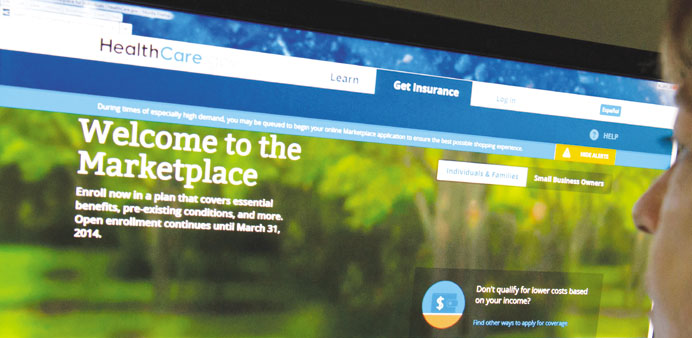This December 2 file photo shows a woman reading the HealthCare.gov insurance marketplace
Internet site in Washington, DC.
Roman Catholic Church-affiliated organisations obtained yesterday last-minute court injunctions that give them temporary exemptions from a part of the Obamacare healthcare legislation that requires employers to provide insurance policies covering contraception.
US Supreme Court Justice Sonia Sotomayor granted one temporary injunction to Baltimore-based Little Sisters of the Poor and Illinois-based Christian Brothers Services, plus related entities.
Two different appeals courts granted stays in three other cases that had been pending at the high court, filed by various organisations, including Catholic University of America and non-profits in Michigan and Tennessee, according to a lawyer representing the groups.
The lower court action meant the Supreme Court did not need to act in those cases.
Justice Sotomayor acted on the injunctions late on Tuesday, just hours before major provisions of the Affordable Care Act were to take effect.
Sotomayor gave the US government until early tomorrow morning to give the court its response in the matter.
The birth control requirement has been one of the most controversial aspects of the Affordable Care Act, and has received spirited pushback from religiously affiliated organisations.
The groups were all asking the courts to exempt them temporarily from the so-called contraception mandate while litigation continues.
The mandate, which would have taken effect for the organisations yesterday, is already in place for many women who have private health insurance.
The organisations accuse the federal government of forcing them to support contraception and sterilisation in violation of their religious beliefs or face steep fines.
The 2010 Affordable Care Act, known as Obamacare, requires employers to provide health insurance policies that cover preventive services for women, including contraception.
The act makes an exception for religious institutions such as houses of worship that mainly serve and employ members of their own faith, but not schools, hospitals and charitable organisations that employ people of all faiths.
As a compromise, the administration agreed to an accommodation for non-profits affiliated with religious entities that was finalised in July.
Under the accommodation, eligible non-profits have to provide a “self-certification” – described by one lower court judge as a “permission slip” – that authorises the insurance companies to provide the coverage.
The challengers say that step alone is enough to violate their religious rights.
In separate cases, the Supreme Court has already agreed to hear oral arguments on whether for-profit corporations have the basis to object to the same contraception mandate on religious grounds.
The court is due to hear the arguments in March and decide the two consolidated cases by the end of June.
The US high court agreed in late November to hear several cases that could settle the dispute between the Obama administration and companies run by Christian conservatives over whether those businesses must pay for birth control if contraceptive coverage conflicts with the religious beliefs of the business owner.
The November announcement that the Supreme Court would hear the constitutional challenge to the birth control mandate in Sebelius vs. Hobby Lobby Stores Incorporated, as well as another case, signaled a new phase of the political battle over the healthcare law.
A decision on the merits of that case by the full Supreme Court could have broader implications, the legal experts have said.
David Green, who founded the Oklahoma-based Hobby Lobby Stores chain involved in one suit, said that business owners “should not have to choose between violating their beliefs and violating the law”.
Since the healthcare law was passed in 2010, the legislation has survived multiple repeal attempts by Republican lawmakers, a US Supreme Court hearing, and a disastrous rollout of the website, HealthCare.gov, set up to assist the launch of the legislation.
Under the law, it is illegal for insurers to deny coverage because of pre-existing conditions or to limit the level of annual reimbursements for essential services – practices in the past which had left some patients facing financial ruin.
It also now is mandatory for any US resident to enrol in a healthcare plan.
Obamacare registers 2.1mn sign-ups
More than 2mn people have signed up for private health insurance through President Barack Obama’s signature reform after a botched rollout, the US government said on Tuesday.
The Affordable Care Act, widely known as Obamacare, is designed to offer insurance to millions of Americans who have never been able to secure it before – some because of pre-existing health conditions like heart disease that insurers were unwilling to cover.
But its launch was hobbled by technical problems, casting doubt that the government could reach its 7mn enrollment goal by the end of March.
Since October 1, more than 2.1mn have secured coverage via Web portals set up by the federal government in 36 states and by local authorities in 14 others, Health Secretary Kathleen Sebelius told reporters in a conference call.
The bulk of the enrolment took place in December after a litany of glitches with the government website, healthcare.gov, which wasn’t able to handle the full onslaught of users until the end of November.
The rocky start has played into the hands of Republicans who say the federal government has no business intervening in the private healthcare market and should not be dictating health choices to Americans.
In addition, 3.9mn people found out via the sites that, due to the reform, they were eligible for coverage through public health insurance programmes including Medicaid, which is geared toward the poorest, according to figures from October and November.
The government did not specify how many of the 6mn people total had previously not had health insurance – a figure that will be key in determining the success of the reform deemed Obama’s top domestic achievement to date. In particular, it was unclear how many simply renewed their coverage.

